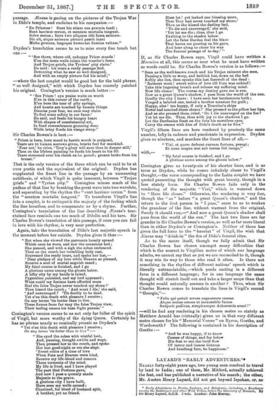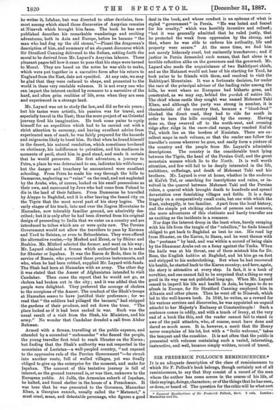LAYARD'S "EARLY ADVENTURES."'
NEARLY forty-eight years ago, two young men resolved to travel by laud to India; one of them, Mr. Milford, actually achieved the feat, and has published a narrative of his march; the other, Mr. Aueten Henry Layard, did not get beyond Ispahan, or, as • Early Adeanttersa In Persia, Suntans, and Babylonia, including, a Beaulaneil among the Bakhtiyari and other Wild Tribe., before the Dieco•• ery of Ninevh. Hy Sir Henry Tamil. G.O.B. 2 vole. London: John Murray.
he writes it, Isfahan, bat was diverted to other destinies, fore- most among which stand those discoveries of Assyrian remains at Nineveh which brought him fame. The book he has now published describes his remarkable wanderings and exciting adventures, both in Asia and Europe, before he became "the man who had dug up the old stones,"—Pisani the dragoman's description of him, and summary of an eloquent discourse which Sir Stratford Canning delivered to the Sultan, setting forth the moral to be derived from Mr. Layard's Assyrian labours. These pleasant pages tell how it came to pass that his steps were turned to Mosul. They are based on the notes he was able to make, which were pat together in a narrative form after his return to England from the East, date not specified. At any rate, we may be glad that they were reduced to shape, and presented to the world in these very readable volumes. It is not every one who can impart the interest excited by romance to a narrative of the hard, and often grim realities of life, even when they are seen and experienced in a strange land.
Mr. Layard was set to study the law, and did so for six years ; but his tastes were artistic, his passion was for travel, and especially travel in the East; thus the mere project of an Oriental journey fired his imagination. He took some pains to equip himself for an expedition which had to be carried out with a strict attention to economy, and haying excellent advice from experienced men of mark, he was fairly prepared for the hazards and exigencies likely to beset him. So that when he found himself in the desert, his natural resolution, which sometimes bordered on obstinacy, his indifference to privation, and his readiness in moments of peril, stood him in good stead, and made it certain that he would persevere. His first adventure, a journey to Petra, a place he was determined to see, indicates his wilfulness ; but the danger and treachery he encountered were excellent schooling. From Petra he made his way through the hills to Damascus, neglecting no " ruins " on the road, and not neglected by the Arabs, who, of course, looked on his small possessions as their own, and succoured by Jews who bad come from Poland to die in the land of their fathers. From Damascus he travelled by Aleppo to Baghdad, and it is after leaving the famed city on the Tigris that the most novel part of his story begins. The early stages of his track, into and over the Zagros Mountains to Hamadan, now tolerably familiar ground, are admirably des- cribed; but it is only after he had been diverted from his original design of proceeding to India that we enter on a country and are introduced to tribes which are or were quite new. The Persian Government would not allow the travellers to pass by Kerman and Yezd to Seistan, or even to Beloochistan. They were offered the alternative routes,—by Meshed and Herat, or by Shiraz and Buehire. Mr. Mitford selected the former, and went on his way; Mr. Layard obtained a firman which authorised him to make for Shuster or Ispahan. It was the Baron de Bode, then in the service of Russia, who procured these precious instruments, and who, when he had been robbed, supplied Mr. Layard with fends. The Shah had been at Hamadan with an army. The other day it was stated that the Ameer of Afghanistan intended to visit Candahar. Then came the report that he would not go, as cholera had broken out in the city; and it was added that the people were delighted. They preferred the scourge of cholera to the scorpions of the Ameer. The conduct of the Shah's troops at Hamadan seems to have justified their preference ; for we read that " the soldiers had pillaged the bazaars," had stripped the gardens of their produce, and out down the trees. "The place looked as if it had been sacked in war. Such was the usual result of a visit from the Shah, his Ministers, and his army." No wonder that Candahar dreaded a call from Abdur Rahman.
Armed with a firman, travelling at the public expense, and attended by a scoundrel " mehmandar " who fleeced the people, the young traveller first tried to reach Shuster on the Karim; but finding that the Shah's authority was not respected in the mountains of Laristan—a well-peopled country, "not exposed to the oppressive role of the Persian Government "—he struck into another route, full of walled villages, yet was finally obliged to give up the enterprise for the moment, and make for Ispahan. The account of this tentative journey is fall of interest, as the ground traversed is, or was then, unknown to the European public. At Julfa, the Armenian suburb of Ispahan, he halted, and found shelter in the house of a Frenchman. It was here that he was presented to the Governor, Manuchar Khan, a Georgian eunuch, usually called the " Matamet," a most cruel, mean, and detestable personage, who figures a good deal in the book, and whose conduct is an epitome of what is styled "government" in Persia. "He was hated and feared for his cruelty," which was horribly inventive and refined; "but it was generally admitted that he ruled justly, that he protected the weak from oppression by the strong, and that, where he was able to enforce his authority, life and property were secure." At the same time, we find him not merely hideously cruel, but eminently treacherous ; and if justice in Persia demanded such means, that fact alone is a terrible reflection alike on the governors and the governed. Mr. Layard also made the acquaintance of two Bakhtiyari chiefs, and as the Matamet would not hear of his starting for Yezd, he took pains to be friends with them, and resolved to visit the Bakhtiyari Mountains. It was a fortunate decision, for under the care of the principal adviser of the leading ruler among the hills, he went where no European had hitherto gone, and penetrated, as we may say, behind the purdah of native life. The chief whose castle they sought was named Mehemet Taki Khan, and although the party was strong in number, it is characteristic of the country that, because a "blood-feud" blocked the direct road, they had to ride far south in order to turn the hills occupied by the enemy. Having done so, they swerved off to the north-west, and crossing ridge after ridge in the snow-clad range, they reached Kal'eh Tul, which lies on the borders of Kuzistan. There are ex- cellent maps in each volume, so that the reader can follow the traveller's course wherever he goes, and easily form a picture of the country and the people from Mr. Layard's admirable descriptions. The country is the considerable tract lying between the Tigris, the head of the Persian Gulf, and the great mountain masses which lie to the North. It is well worth attention, and few will fail to be deeply interested in the life, ambitions, sufferings, and death of Mehemet Taki and his brothers. Mr. Layard is ever at home, whether in the auderam at Kal'eh Tul, or searching for inscriptions and rains, or in- volved in the quarrel between Mehemet Taki and the Persian rulers, a quarrel which brought death to hundreds and spread devastation over flourishing villages and fields. It is a deep tragedy on a comparatively small scale, but one with which the East, unhappily, is too familiar. Apart from the local history, and the simple yet striking sketches of persons and manners, the mere adventures of this obstinate and hardy traveller are as exciting as the incidents in a romance.
Nor does the interest droop in the least when, barely escaping with his life from the tangle of the "rebellion," he finds himself obliged to get back to Baghdad as best he can. His road lay from Shuster, on the Karen, to Basra, and he went thence with the " postman " by land, and was within a second of being slain by the Shammer Arabs out on a foray against the 'Parks. When the knife was at his throat, one of them mistook him for Dr. Ross, the English halthim at Baghdad, and let him go on foot and stripped to his underclothing. But when he had recovered his health, he started back to the Karen country; and here, again, the story is attractive at every step. In fact, it is a book of novelties, and one cannot fail to be surprised that a thing so very good in its way was not published long ago. When Mr. Layard ceased to imperil his life and health in Asia, he began to do so afresh in Europe, for Sir Stratford Canning employed him in Albania and other places. Then he went off to Nineveh, which led to the well-known book. In 1848, he writes, as a reward for his various services and discoveries, he was appointed an unpaid attachd to her Majesty's Embassy at Constantinople ! Such a sentence comes in oddly, and with a touch of irony, at the very end of a book like this, and the reader cannot fail to stand in awe of the paid attaches, who, of course, must have done and dared so much more. It is, however, a merit that Sir Henry never complains of his lot, but with a "frolic welcome," takes the tempest and the sunshine. It is not often that the public is presented with volumes containing such a varied, interesting, instructive, and well, because simply written, record of travel.







































 Previous page
Previous page